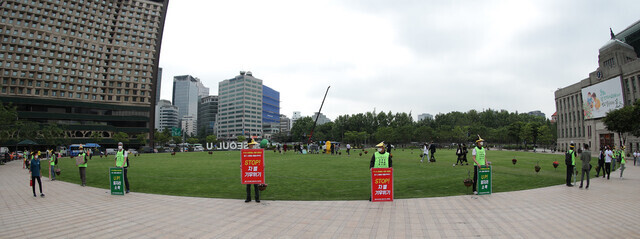hankyoreh
Links to other country sites 다른 나라 사이트 링크
P4G adopts Seoul Declaration for inclusive partnership against climate change

The 2021 P4G Seoul Summit, which was the first multilateral environmental summit to be hosted by South Korea, concluded Monday with the adoption of the “Seoul Declaration.”
The participating countries said in the declaration that they “recognize the climate crisis as an urgent global threat whose impacts reach beyond the environment agenda to include economic, social, security and human rights-related challenges.”
“We need to engage in inclusive partnerships in which governments, businesses and civil society are part of collective solutions, for current and future generations,” they said.
South Korean President Moon Jae-in took part in a discussion during the second day of the summit Sunday on the topic of “inclusive green recovery towards carbon neutrality.” He was joined by 13 heads of state and senior leaders, including European Commission President Ursula von der Leyen, US climate envoy John Kerry, and International Monetary Fund Managing Director Kristalina Georgieva.
Moon said that the international community should “increase cooperation to achieve inclusive green recovery by focusing on technology, resources and the cultivation of capabilities.”
“When it comes to climate issues, there are no borders. It is very important for us to work together, understanding the different economic and social conditions faced by advanced and developing economies,” he said.
He added that South Korea would “play the part of a bridge connecting advanced and developing economies in order to promote solidarity and cooperation by the international community.”
To this end, he announced plans to focus on building the capacities of developing economies through support for eco-friendly technology through the Climate Technology Center & Network cooperation office and green technology center set up in South Korea last year, as well as expanded official development assistance (ODA) in climate-related areas.
The countries and organizations taking part in the summit adopted a “Seoul Declaration” reflecting the outcome of the meeting.
The declaration included recommendations to keep the rise in global temperatures to within 1.5 degrees Celsius, encourage increases in nationally determined contributions to reduce greenhouse gases, increase awareness of desertification and land degradation, speed up efforts to transition away from coal to other energy sources, work together internationally to resolve the marine plastic issue, advance an inclusive and just transition for socially vulnerable groups, underscore the importance of civil society playing an active role in climate action, and promote Environmental, Social and Governance activities by corporations.
While the participating countries agreed on the need for a global response to the climate crisis, the debate over funding issues continues to rage.
The UN Framework Convention on Climate Change, which was adopted in 1992, states that advanced economies are obliged to support developing ones but does not specify funding targets or means of procurement.
According to some estimates, keeping the global temperature rise to within 1.5 degrees Celsius will require new investments of anywhere from US$1.6 trillion to US$3.8 trillion through 2050. Moon’s pledge to increase ODA in climate- environment-related areas came in response to these demands.
“The purpose of this summit was to establish support so that not only advanced economies but also developing ones can participate in the climate response, and to translate that into public-private cooperation,” a Blue House official said.
“[South Korea has] realized some achievements in playing a bridge role in climate diplomacy this year, from the Leaders Summit on Climate in April to the Conference of the Parties event this coming November,” the official added.
By Lee Wan, staff reporter
Please direct comments or questions to [english@hani.co.kr]

Editorial・opinion
![[Correspondent’s column] The real reason the US is worried about Chinese ‘overcapacity’ [Correspondent’s column] The real reason the US is worried about Chinese ‘overcapacity’](https://flexible.img.hani.co.kr/flexible/normal/500/300/imgdb/original/2024/0510/5217153290112576.jpg) [Correspondent’s column] The real reason the US is worried about Chinese ‘overcapacity’
[Correspondent’s column] The real reason the US is worried about Chinese ‘overcapacity’![[Editorial] Yoon’s gesture at communication only highlights his reluctance to change [Editorial] Yoon’s gesture at communication only highlights his reluctance to change](https://flexible.img.hani.co.kr/flexible/normal/500/300/imgdb/original/2024/0510/7717153284590168.jpg) [Editorial] Yoon’s gesture at communication only highlights his reluctance to change
[Editorial] Yoon’s gesture at communication only highlights his reluctance to change- [Editorial] Perilous stakes of Trump’s rhetoric around US troop pullout from Korea
- [Guest essay] Preventing Korean Peninsula from becoming front line of new cold war
- [Column] The state is back — but is it in business?
- [Column] Life on our Trisolaris
- [Editorial] Penalties for airing allegations against Korea’s first lady endanger free press
- [Editorial] Yoon must halt procurement of SM-3 interceptor missiles
- [Guest essay] Maybe Korea’s rapid population decline is an opportunity, not a crisis
- [Column] Can Yoon steer diplomacy with Russia, China back on track?
Most viewed articles
- 1[Book review] Who said Asians can’t make some good trouble?
- 2Korea poised to overtake Taiwan as world’s No. 2 chip producer by 2032
- 3[Correspondent’s column] The real reason the US is worried about Chinese ‘overcapacity’
- 4[Editorial] Yoon’s gesture at communication only highlights his reluctance to change
- 5Yoon rejects calls for special counsel probes into Marine’s death, first lady in long-awaited presse
- 6Korea likely to shave off 1 trillion won from Indonesia’s KF-21 contribution price tag
- 7‘Free Palestine!’: Anti-war protest wave comes to Korean campuses
- 8S. Korea “monitoring developments” after report of secret Chinese police station in Seoul
- 9Nuclear South Korea? The hidden implication of hints at US troop withdrawal
- 10Yoon voices ‘trust’ in Japanese counterpart, says alliance with US won’t change